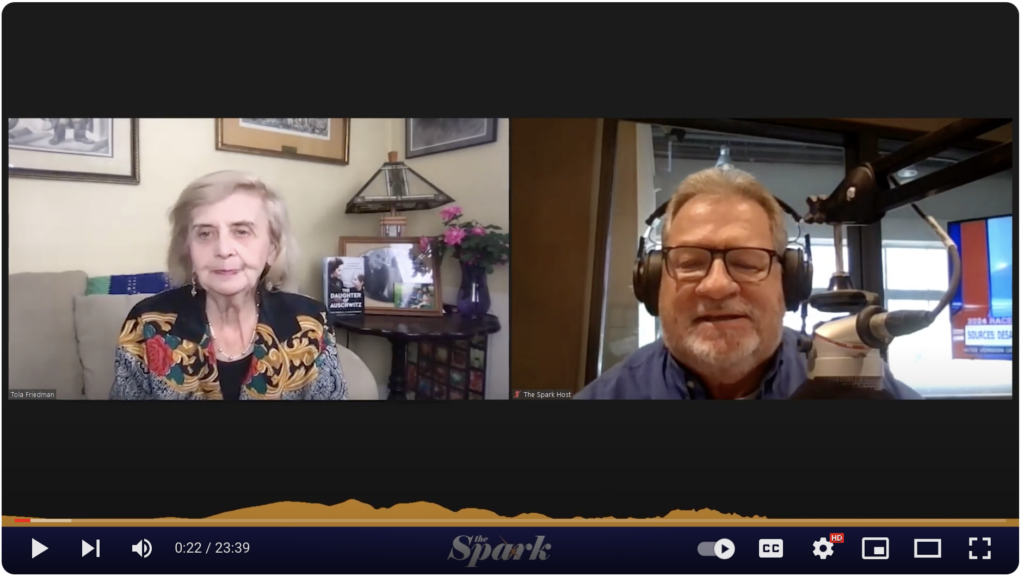Holocaust survivor Tova Friedman writes about her harrowing story
As a child, Friedman was sent to a gas chamber at Auschwitz and came out alive by a twist of fate
The Holocaust was the systematic and state-sponsored persecution and murder of six million Jewish men, women and children by the Nazi regime and its collaborators. The Nazis, believed that Germans were “racially superior” and they wanted to create a “racially pure” state. Jews, deemed “inferior,” were considered an alien threat to the so-called German racial community.
In the 78 years since World War II ended with the defeat of Nazi Germany, there have been many stories told of the murders and atrocities committed against Jews.
However, our guest on The Spark Thursday, told one of the most harrowing and graphic.
Tova Friedman was born in Central Poland in 1939 and she and her family lived under the domination of Nazis for the first six years of her life. She and her parents were eventually sent to concentration camps and survived.
Tova Friedman has written a new book called The Daughter of Auschwitz – My Story of Resilience, Survival and Hope.
On The Spark Thursday, Friedman was asked about the many close calls she had during the Holocaust , but survived,”I really think a lot of it was luck because I would hate to think that I was chosen or I was better or whatever. Well, a million and a half children were murdered. I think it was just luck being the right time, the right place, a good even quota. For instance, when I got off the cattle car in Auschwitz, it was a Sunday. Could have been a been Monday and Tuesday. But I learned this years later, of course. And apparently the Nazis were Christians and they didn’t want to work so much on Sunday. So they only had four crematoriums going and they didn’t want to start a fifth one. So they let me in thinking because, I mean, Birkenau, Auschwitz-Birkenau was only in one purpose, the purpose of of of killing people. So again, that was pure luck. Had I come a different day, I wouldn’t have been here to tell the story because every child, every single child, 99.9 children were killed as soon as they arrived, unless they were old enough to work.”
LISTEN TO THE SPARK ON YOUR FAVORITE PLATFORM
Just before her sixth birthday, Friedman was among a group of children led to a gas chamber. Her mother and other women were housed separately but saw the children being led away when Tova heard her mother call her name,” I was walking and I heard my name called. You know, I haven’t heard my name for a long time because I was a number. And when I said, oh, my mother’s voice, she said, Where are you going? I said to the gas chambers. And the women were screaming. And I remember turning to the little girl next to me. We were partners walking. And I said, Why are they crying? I thought, every Jewish child has to go to the gas chamber. It was just normal, you know, normal and and kept walking.”
The children undressed and stood in the cold gas chamber for hours but finally they were told to talk back to their barracks. Whether it was a mistake or for some other reason, she never learned why they weren’t gassed.
Before she was sent Auschwitz, Tova witnessed atrocities and lived under a kitchen table,” I lived mostly under the table because for many reasons it was very crowded and I had no place physically, I had no place was a tiny apartment with a lot of people, some strangers. So we knew (what was going on outside) and it was it was comfortable. It had blankets. And my mother fed me there, whatever food we had. And. But I do remember the death of my grandmother. They came in. They just took her and shot her. There was the beginning when they decided that all elderly, elderly men over 50 years old were worthless. And then I remember the death of my father’s parents. I didn’t see that. I did see the death of my grandmother. She was shot outside the house, but not of my parents, my father’s parents. He came in and he told my mother and he just puts them on a truck. But I knew where the trucks were going because people talked about it. You know, you live in a crowded situation, mostly adults. And my mother believed that, letting me know what’s going on, so on. So I get prepare myself for life and and he they would his parents were taken and they were shocked and I knew exactly how because people talked about it. You know, kids listen especially you’ve got nothing else to do a whole day. You’re starving. You have no toys of any kind. You don’t have other children to play with. You listen to the adults. The more I learned the language I was young, the more I understood, Oh, that’s what happened. And then they all the elderly were taken, undressed, naked, and they were all positioned, stood by the by the communal grave and shot from the back. And they fell right into the graves. I know also that my father dug, a grave like that. People from the age of 20, sometimes thirties were the able bodied people. They dug the graves for their own parents and for their own children. The Germans didn’t do the dirty work There was our old people did it for our own people under duress or they wouldn’t shot.”
After escaping death many times, Friedman and her parents were liberated from the concentration camps where they were imprisoned, returned to their hometown in Poland where they faced anti-semitism, moved to the United States, to Israel and back to the U.S. She is now 84-years-old and has worked as a therapist most of her life.

